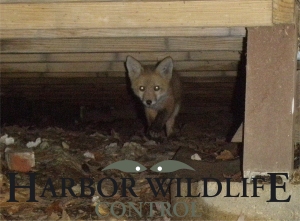Fox Control & Removal Services
 Red Fox Living Under a Deck |
A healthy fox in the wild are an important part of the natural ecosystem. Because of diminishing habitat and increasing numbers, however, foxes living in or close to human communities sometimes create a nuisance or health hazard to people, domestic pets, and livestock.
Foxes are vulnerable to and can transmit a number of serious zoonotic diseases including rabies, mange, canine distemper, parvo enteritis, roundworms, and other endoparasites. They also may be involved in the transmission of arboviral diseases vectored by fleas, ticks, and other external parasites that commonly infest wild animals.
Wild foxes also occasionally attack and kill livestock, especially chickens, ducks, game birds, and their eggs. Less commonly, they may attack young lambs, rabbits, and other small domestic animals and pets — especially if they are left unprotected at night. Even more rarely, foxes may damage food or feed crops; but what little damage they do to crops probably is more than offset by their helping to control smaller animals and insects that are more destructive.
 Red Fox |
In many cases, it's not really necessary to trap fox. Proper sanitation to remove attractants and the construction of secure fences, coops, and pens to exclude foxes and protect livestock are usually sufficient to solve most fox problems. Harbor wildlife Control provides expert fox exclusion services throughout all of New Jersey.
In some cases, fox trapping or fox removal may also be necessary, especially where fox populations are especially high, natural food sources scarce, and fox under increased pressure to find food. Fox trapping and removal is also needed when a fox is suspected of being rabid or otherwise ill. In addition, foxes who have become a little too comfortable around people also should be trapped and removed because they may attack when unintentionally threatened by humans (especially small children, who may try to pet them).
To evict "Sly Fox" from your property, just give us a ring at (732) 583-5516
| Middlesex County | Monmouth County | Somerset County | Union County | Warren County |
| Sussex County | Morris County | Essex County | Hudson County | Hunterdon County |
and Richmond County (Staten Island), NY